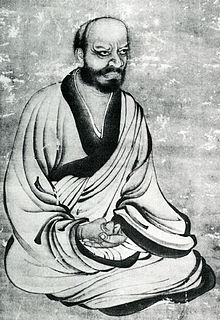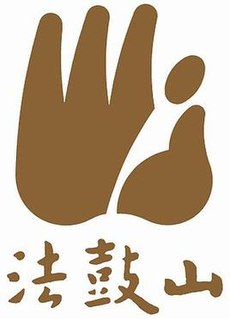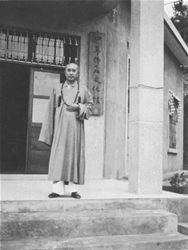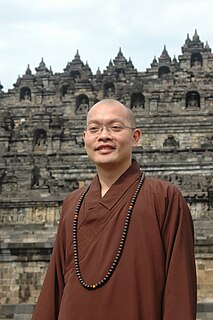Related Research Articles

Linji Yixuan was the founder of the Linji school of Chan Buddhism during Tang Dynasty China.

Chinese Buddhism or Han Buddhism is a Chinese form of Mahayana Buddhism which has shaped Chinese culture in a wide variety of areas including art, politics, literature, philosophy, medicine and material culture. Chinese Buddhism is the largest institutionalized religion in Mainland China. Currently, there are an estimated 185 to 250 million Chinese Buddhists in the People's Republic of China It is also a major religion in Taiwan and among the Chinese Diaspora.

Zhiyi also Chen De'an (陳德安), is the fourth patriarch of the Tiantai tradition of Buddhism in China. His standard title was Śramaṇa Zhiyi (沙門智顗), linking him to the broad tradition of Indian asceticism. Zhiyi is famous for being the first in the history of Chinese Buddhism to elaborate a complete, critical and systematic classification of the Buddhist teachings. He is also regarded as the first major figure to make a significant break from the Indian tradition, to form an indigenous Chinese system.

Sheng Yen, born Zhang Baokang, was a Taiwanese Buddhist monk, religious scholar, and writer. He was one of the mainstream teachers of Chan Buddhism. He was a 57th generational dharma heir of Linji Yixuan in the Linji school and a third-generation dharma heir of Hsu Yun. In the Caodong lineage, Sheng Yen was a 52nd-generation Dharma heir of Dongshan Liangjie (807-869), and a direct Dharma heir of Dongchu (1908–1977).

John Hurrell Crook was a British ethologist who filled a pivotal role in British primatology.

Dharma Drum Mountain is an international Buddhist spiritual, cultural, and educational foundation founded by late Chan master Sheng-yen. The center focuses on educating the public in Buddhism with the goal of improving the world and establishing a "Pure Land on Earth" through Buddhist education. The international headquarters of this organization is located at Jinshan District, New Taipei City, Taiwan.
Below is a timeline of important events regarding Zen Buddhism in the United States. Dates with "?" are approximate.

Karma Thinley Rinpocheཀརྨ་འཕྲིན་ལས་རིན་པོ་ཆེ་, is an important master of the Kagyu Mahamudra, Sakya Lamdré and Chod traditions of Tibetan Buddhism active in the west and Nepal. He is also well regarded by Tibetans as a scholar, poet and artist.

Chi Chern was the first appointed Dharma heir of renowned Chan Master Sheng-yen. He is also one of the most respected meditation teachers in Malaysia and Singapore. Born in Malaysia and ordained as a monk by Master Chuk Mor in Penang, he later went to Taiwan to study at Fo Guang Shan Institute of Chinese Buddhism.

Guo Yuan is a Vietnamese Buddhist monk trained in Chan Buddhism. He is a senior disciple of Chan master Sheng-yen of Taiwan. In 1985 he first encountered Sheng-yen's teachings while attending a seven-day retreat in New York. He then decided to become a disciple before finally leaving his job in Toronto, Ontario, Canada, to become a monk in the Chan tradition. He was ordained in 1987 in Taiwan. He is active in zen retreats in Dharma Drum Mountain.

The Nung Chan Monastery is a monastery at Beitou District, Taipei, Taiwan. It is formally founded in 1975 by Ven. Dongchu, a scholar monk and disciple of renowned Chinese Buddhist Master Taixu. It's named ' Farming Ch'an ' as its early residents dedicated themselves to Ch'an practice and grew their own food. Its spirit is based on 8th century Zen Master Baizhang Huaihai's aphorism, "A day without work is a day without food."

Dongchu was a Chinese Ch'an Master in Mainland China and later in Taiwan, and also the teacher of respected modern-day Ch'an Master Sheng-yen. He is the 51st generation of Zen patriarch from the Caodong School. He also established several monasteries and organizations in Taiwan that continue to exist and expand to this very day, including Chung-hwa Institute of Buddhist Culture and Nung Chan Monastery.
Zen is a school of Mahayana Buddhism that originated in China during the Tang dynasty, known as the Chan School, and later developed into various sub-schools and branches. From China, Chán spread south to Vietnam and became Vietnamese Thiền, northeast to Korea to become Seon Buddhism, and east to Japan, becoming Japanese Zen.

Jimmy Yu, also known as Guo Gu, is a Chan teacher and a scholar of Buddhism. He was the bassist for the American 1980s hardcore bands Death Before Dishonor and Judge. After his youthful days in hardcore straight edge, he returned to Buddhism and became a monk under Chan Master Sheng Yen. In 2000, he left monasticism to pursue academia. He received an MA degree in Chinese Buddhist studies from University of Kansas in 2002 and a Ph.D. from Princeton University's Department of Religion in 2008.

Chan, from Sanskrit dhyāna, is a Chinese school of Mahāyāna Buddhism. It developed in China from the 6th century CE onwards, becoming especially popular during the Tang and Song dynasties.
The Five Houses of Chán were the five major schools of Chan Buddhism that originated during Tang China. Although at the time they were not considered formal schools or sects of Buddhism, they are now regarded as important schools in the history of Chán Buddhism. Most Chán lineages throughout Asia and the rest of the world originally grew from or were heavily influenced by the original five houses of Chán.
Zen was introduced in the United States at the end of the 19th century by Japanese teachers who went to America to serve groups of Japanese immigrants and become acquainted with the American culture. After World War II, interest from non-Asian Americans grew rapidly. This resulted in the commencement of an indigenous American Zen tradition which also influences the larger western (Zen) world.

Ven. Guo Jun is a Buddhist monk in Singapore, and one of the youngest Dharma heirs of Chan Master Sheng-yen. His complete Dharma name is Zhengyan Guojun (正彥果峻). He has published three books: Essential Chan Buddhism, Chan Heart, Chan Mind and Falling is Flying: The Dharma of Facing Adversity together with Ajahn Brahm.
The Four Heavenly Kings of Taiwan refers to four masters in Taiwanese Buddhism who each founded an influential Buddhist institution in the country. The term draws its name from the Four Heavenly Kings who each rule over one of the heavenly realms in Buddhist cosmology. Like the Four Heavenly Kings mythology, each Buddhist teacher corresponds to one cardinal direction, based on where their organization is located in Taiwan. The corresponding institutions of the masters are referred to as the "Four Great Mountains".
The Four Great Mountains of Taiwan refers to a group of four prominent organizations in Taiwanese Buddhism. The term draws its name from the Four Sacred Mountains of China, four mountains in mainland China that each hold sacred Chinese Buddhist sites. The founders of the institutions are collectively referred to as the Four Heavenly Kings of Taiwanese Buddhism. Each of the "Four Heavenly Kings" corresponds to one cardinal direction, based on where their organization is located in Taiwan. The institutions that make up the "Four Great Mountains" of Taiwanese Buddhism are:
References
- ↑ "Archived copy". Archived from the original on 2010-04-20. Retrieved 2009-10-14.
{{cite web}}: CS1 maint: archived copy as title (link) - ↑ "Teachers of the Western Chan Fellowship".
- ↑ "Archived copy". Archived from the original on 2009-05-08. Retrieved 2009-10-13.
{{cite web}}: CS1 maint: archived copy as title (link)